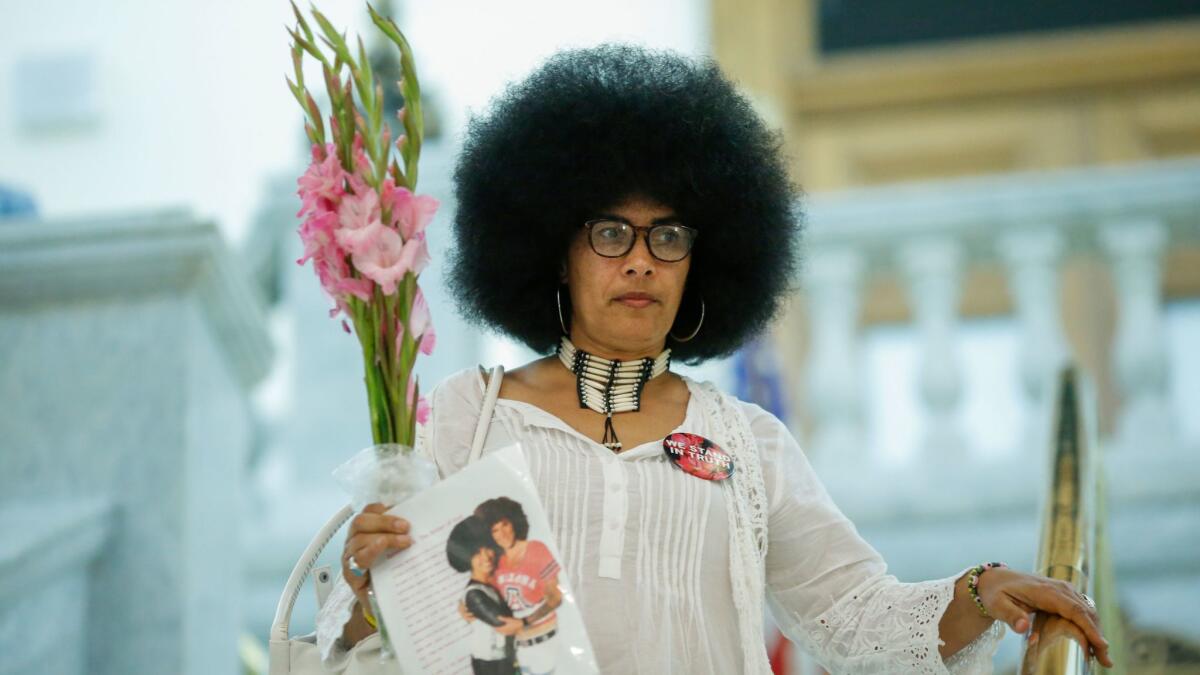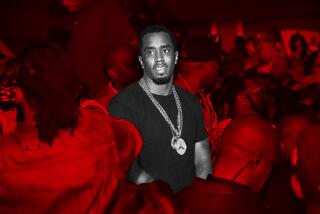Bill Cosby’s accuser has her dramatic, detailed day in court

Bill Cosby trial begins its second day with mother of accuser testifying about the effects Cosby interaction had on her daughter.
Reporting from NORRISTOWN, PA. — In the nearly three years since women began stepping forward en masse to accuse Bill Cosby of sexual assault, none ever achieved what most abuse victims wish for: a day in court.
No longer.
Andrea Constand took the witness stand at the Cosby trial Tuesday and faced off against her alleged attacker in a dramatic moment that has long been called for by survivors of sexual violence.
“There, wearing a dark-colored coat, brown tie and white shirt,” Constand said, gesturing, when asked to point out the entertainer who is accused of violating her at his Philadelphia-area mansion. He glanced down quickly at his clothing, then sat stoically.
With that, the 44-year-old massage therapist from Toronto embarked on an emotional and detailed account of a friendship that began when she met Cosby while running operations for the women’s basketball team at Philadelphia’s Temple University in 2002, and continued through half a dozen dinners and social engagements in which he mentored her for a sports broadcasting career, till the night in January 2004 when she says he gave her with three pills and penetrated her with his fingers.
The testimony offered a full account, under oath, of a narrative similar to what other women had expressed only in scattered op-eds and TV appearances, often about encounters dating back many decades. It brought to the fore an accuser who had been shrouded in shadow, and seized back a cultural text that, with the accusations leveled at Bill O’Reilly and the boasts made by Donald Trump, many felt had too often focused on the aggressor instead of the aggrieved.
Cosby is charged with three counts of aggravated indecent assault against Constand and could face a decade in jail if he’s found guilty. But for a moment in a suburban courthouse Tuesday afternoon, legal outcomes took a back seat to the importance of testimony, as a woman offered a first-person lens onto the evolving dynamic between a mega-celebrity and his alleged sexual assault victim.
“He was a Temple friend, somebody I trusted, a mentor, and somewhat of an older figure to me,” Constand said of the entertainer, who served as a trustee at the Pennsylvania school.After meeting Constand via a mutual friend, Cosby started calling her on her university-issued cellphone about issues such as renovations to the team’s facilities. Constand described the ways Cosby would soon come to inquire about her personal life and eventually act like a patron. He would introduce her to important people — machers in the Philadelphia restaurant business, figures of distinction in the city’s university community, even a television writer and agent in New York, on trips he partly subsidized. She showed her appreciation by calling on him often and even giving him gifts — bath salts, Temple apparel.
See the most-read stories in Entertainment this hour »
But Constand also recounted details that raised red flags, at least in retrospect. In an Ontario lilt, she told of the time he invited her to his show at Foxwoods Resort Casino in Connecticut and asked her to his room to share “baked goods,” then lay back on the bed and brushed his knee against her leg. Or a series of awkward dinners, in which Cosby would invite her to his mansion and have the chef prepare a meal that she would then eat by herself, with Cosby popping in only occasionally to check on her.
Constand appeared upbeat and relaxed as she entered the courtroom, and increasingly serious and impassioned as her testimony wore on. By the time she got to the January 2004 night, the tension had become almost cinematic.
“What are they — are they natural? Are they herbal?” she recalled saying when Cosby handed her three blue pills after a dinner at his home.
“He said ‘put them down [your throat]. They’re your friends; they’ll take the edge off,’” she said.
Constand was dubious. So many, she asked? She says he nodded and she told Cosby she trusted him — in their conversations about basketball they had discussed herbal supplements — and swallowed them all.
Things soon went awry, she testified: “I began slurring my words. I told Mr. Cosby I had trouble seeing him — that I could see two of him. My mouth was very cottony.” She said stood up and found that her legs could barely support her.
He led her to the couch, helped her lie down and provided a pillow for support, and she lost consciousness, she testified. An indeterminate amount of time later, she said, she was jolted awake by physical contact: “I felt Mr. Cosby’s hands groping my breasts under my shirt. I also felt his hand inside my vagina moving in and out. I felt him take my hand and place it on his penis and move it back and forth.”
Why didn’t she stop him? a prosecutor asked.
“I wasn’t able to.”
Push him away?
“In my head I was trying to get my hands to move or my legs to move but I was frozen and those messages didn’t get there.”
She said she could only retreat into her own mind. “I wanted it to stop,” she said on the stand, her voice cracking. “I felt really humiliated. I just wanted to go home.”
Constand said she finally was able to summon the strength at about 5 a.m. She rose and prepared to walk out the door, back to her car. She said Cosby was waiting for her in the kitchen, and offered her a muffin and tea. She had a few bites and sips, then left.

The very presence of Constand in the courtroom was a plot twist even to those who’ve been following the 18-month array of legal proceedings against Cosby. Constand had become a kind of spectral presence — cited, debated and even psychoanalyzed, but never appearing in court.
Even Tuesday, few expected to see her. Just before she appeared, her brother-in-law, a Canadian police officer, was called to testify about how he learned of the allegations, a tangent that made her seem more remote than ever.
The prosecution’s announcement a few minutes later that they were calling Constand to the stand, and so early in the trial — it was just the second day — caused a gasp in the gallery. It was such a surprise that even the judge, Steven T. O’Neill, didn’t know she would testify, and at the end of the day rebuked the prosecution for not informing him. Prosecutors said they had told the defense, but Cosby’s lawyers all shook their head and mouthed, “We didn’t know.”
On the stand, the prosecution sought to preempt one line of attack by the defense: why Constand had maintained contact with Cosby after the alleged assault. She said she had done so only because he continued to call about Temple business and she feared losing her job.
Prosecutors also asked why she had taken a year to come forward. “If I went to the police, I thought Mr. Cosby would retaliate and try to hurt me,” Constand said. “What had happened to me … it was overwhelming.”
The cross-examination of Constand, which began late Tuesday afternoon before adjournment for the evening, sought to suggest there are had been romantic contact between the two before the night of the alleged incident.
“You were alone in a hotel room with a married man,” defense lawyer Angela Agrusa said of the Foxwoods evening.
The defense also spent time pointing out inconsistencies between the details of her testimony and a police report, such as in the circumstances preceding the alleged incident.
Constand explained during the direct examination why the accounts didn’t always square: “I was just really confused. I had a lot going through my mind.”
Whether Constand’s testimony will resonate with the jury in the way the prosecution hopes remains to be seen — experts were debating the matter after court adjourned for the day. At least in part it will depend on the rest of the cross-examination. But strategic issues were not on the minds of many people at the trial Tuesday.
Outside the courthouse, as evening crept in, Lili Bernard, a co-star of Cosby’s on “The Cosby Show” who accuses the actor of assaulting her, spoke to reporters about the testimony of Constand, whom she’s come to know over the last few years.
“She’s seldom emotional,” said Bernard, who had sat in the back of the courtroom wearing a “We stand in truth” button and holding pink gladioluses in solidarity with Constand. “To hear her talk about something I never heard her talk about, to see her cry, was really difficult for me.
“But what I witnessed today in the courtroom is something she taught me,” the activist artist added. “Even in the most vulnerable state you can find courage.”
Twitter: @ZeitchikLAT
ALSO
How the breakout of ‘Wonder Woman’ did – and didn’t – play in Gal Gadot’s native Israel
Even before the train killings, Portland was embroiled in conflicts over hate and racism
UPDATES:
7:20 p.m.: The story was updated throughout with afternoon testimony.
1:10 p.m.: The story was updated with Andrea Constand’s testimony.
This story was originally posted at 11:15 a.m.
More to Read
Sign up for Essential California
The most important California stories and recommendations in your inbox every morning.
You may occasionally receive promotional content from the Los Angeles Times.











